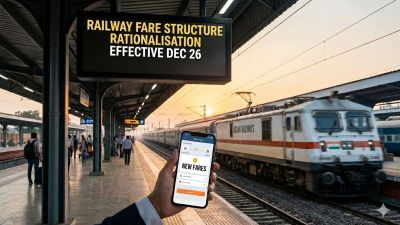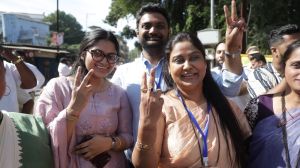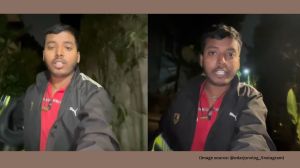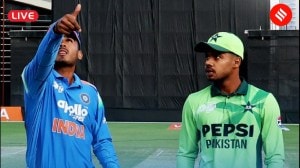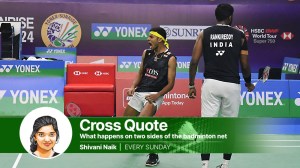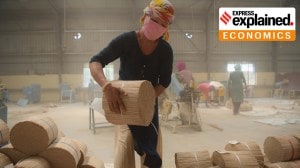At one point during the polls,I thought we were losing the battle to money power. That didnt happen
Quraishi speaks about elections being the source of corruption,the worthiness of EVMs and the scale of Indian elections
Fresh from the success of conducting five assembly elections,Chief Election Commissioner S Y Quraishi was at the Express for an Idea Exchange. In this session moderated by Consulting Editor Seema Chishti,Quraishi speaks about elections being the source of corruption,the worthiness of EVMs and the scale of Indian elections
Seema Chishti: Can you recall one nasty moment in the recent state assembly polls when you were worried and scared that things may fall apart?
S Y Quraishi: These were very difficult elections to conduct in the sense that at least two states were particularly difficult: West Bengal had its law and order problem. It has had a history of political violence. Prior to the elections,people warned us that a civil war kind of situation prevailed there,so we had to be very careful. In Tamil Nadu,we were very worried about the money power because during the Thirumangalam by-election,gross violations were reported and that was the model being feared. So,we planned most for these two states. Kerala was easy,so was Puducherry. Assam had a bit of a problem in that it had its own militancy-related issues,the border issues and law and order issues but we deal with these issues day in and day out.
Seema Chishti: One particular incident or moment that really worried you?
S Y Quraishi: At one point of time,I thought we were losing the battle against money power which made me depressed. My colleagues assured me that it was not the case. If we had lost to money power,it would have been very serious for the country,because,as I have said before,elections have become the root of all corruption in India. It may sound paradoxical and shocking for an Election Commissioner to say this but if someone spends say Rs 2 to 5 crore, beyond his means,to fight an election,naturally he would want to recover that money. This is the real basis of corruption in India and we need to check it. It is not for nothing that the law has prescribed a ceiling on election expenditure. This was raised from Rs 10 lakh to Rs 16 lakh for assembly elections and from Rs 25 to Rs 40 lakh for parliamentary elections. We have information that it is violated with impunity. We try our best to catch the violators and they try their best to hoodwink us,so there is a constant tug-of-war. Sometimes we win,sometimes we lose. This is a very serious issue. However,I am personally satisfied, that the very people who were being offered money,saris and dhotis,were the ones who complained to us.
Coomi Kapoor: Is this money power more in the South than in the North because the states you have highlighted are mostly in the South. Earlier you spoke of Andhra Pradesh.
S Y Quraishi: We cannot generalise. It is across the country in varying degrees. For instance,in Chennai,every political party expressed concern about money power. In Thiruvananthapuram,however,political parties said there was no money power problem. We found that very interesting: Kerala and Tamil Nadu share a long border but in Kerala,we were told by all political parties that the voters are very perceptive. They decide in their minds who they are going to vote for,and money is not going to change their minds,so why waste money? I think thats the best check on money power. In Kerala,money was not an issue for us at all whereas in Tamil Nadu,it was giving us sleepless nights. Andhra Pradesh and Karnataka also have worrisome money power.
Coomi Kapoor: And what is the going rate for an MLA?
S Y Quraishi: You mean what amount they spend on elections? It is impossible to quantify. It can only be anecdotal. In private conversations,MPs and MLAs have told us they spend Rs 2 to Rs 5 crore and more! But we require evidence. What is discussed in seminars and conferences cannot become a basis for legal action. What we try to do is catch the money that is used: how many cars are deployed,how many public meetings have been conducted,etc. But what goes on,privately,how much money changes hands,is anecdotal. This time we have done something new,starting with the Bihar assembly elections: a few months before the election,we set up an Expenditure Monitoring Division which will monitor the money power throughout the year. We unleashed the entire Income Tax machinery,intelligence,air intelligence to keep an eye on the money power and that has paid dividends. It worked well in Bihar,we fine-tuned it and implemented it in the recent polls.
Vandita Mishra: As CEC,how do you look at protests against corruptionlike Anna Hazares fast and Swami Ramdevs fast next monthparticularly in view of the fact that right after Hazares fast,the five states that went to the polls registered higher voter turnout than earlier.
S Y Quraishi: Its a fact that India has a lot of corruption and that people are getting increasingly fed up. It is unfortunate that a situation developed where Anna Hazare had to go on a fast. We do need a Lokpal to check corruption at the highest level but that is not going to tackle the problem of corruption completely. What will the Lokpal do? Out of thousands of people,he would identify a few corrupt people and hound them out. We are saying that in the first place,dont allow the corrupt to come to power. Why do we allow them to fight elections? Debar criminals from contesting elections,check money power by self-discipline and cooperating with the Election Commission. Tahrir Square has become part of everyday expression even in India,which is scary. Why has Jantar Mantar become a rallying point when barely a few hundred metres away,we have Parliament? That is where major decisions of policy and governance should take place. Incidentally,ECI headquarters is between these two places. I think this is a wake up call and we should wake up to it.
Manoj C G: In the run up to the elections,did you feel that the expenditure ceiling has become meaningless and it should be done away with?
S Y Quraishi: There is a good reason why the law has provided for a ceiling. If there is no ceiling,money will play havoc. Then the common man will have no chance of contesting elections. Not to have a ceiling is a dangerous proposition. We have been asking that the power to fix a rational ceiling should be with us in consultation with political parties. We wrote to the Law Ministry that the last ceiling was fixed in 1995-96 and just by the rate of inflation,Rs 10 lakh will be Rs 16 lakh today. But what is the rational limit is a subject of public debate. Incidentally,MPs and MLAs report their expenditure well within the ceiling even if they may have spent ten times more. So,theoretically,even this ceiling is not being used.
Sanya Sharma: Why has the Election Commission not yet recommended state funding of elections as recommended by the Indrajit Gupta Committee.
S Y Quraishi: We are not recommending it,we are opposing it. Even Indrajit Gupta Committee said partial state funding can be considered provided there is total inner-party democracy and transparency of political funding. There is hardly any inner-party democracy. We have been demanding that all donations to political parties should be by cheque and all transactions by them should be by cheque,which is not happening. So,they must fulfill the first criteria of the Gupta committee. I particularly oppose it because it is not the obvious,legal expenditure we are talking about. Everybody is reporting 60-70 per cent of the ceiling. State funding will mean that much more money will become available for clandestine use. There is no guarantee that black money will be stopped.
Vandita Mishra: What role can the EC play so that parties comply with their promise of inner-party democracy?
S Y Quraishi: After money power,our next concern is party functioning,their financing. We are going to monitor it strictly now. Inner-party democracy should be a condition for party registration but unfortunately,we have no power to deregister parties. The time has come for the country to give us that power and for us to use whatever power we have to address the issue.
Seema Kushwaha: The Arjun Sengupta Committee says 77 per cent of Indians live on Rs 20 a day. On the other hand,over 60 per cent people participated in the elections. When 77 per cent people are living on such low incomes,can they choose the right representatives?
S Y Quraishi: We cannot assume that poor people are not smart enough to vote. The voters of India are the smartest in the world. Ask the political parties when they lose elections. Voters know that even if they do not have money,they have the right to vote,and they know how to use it.
Rakesh Sinha: Which of the next state elections requires special attention?
S Y Quraishi: There is a bunch of five states going into elections by early next year. The biggest is Uttar Pradesh,which is one fifth of India and it has its own issues. It is a very difficult state,but last time it had perfect elections. We are optimistic that it will be a good election. Punjab can be another difficult stateit has a lot of money and it has a bit of muscle power too. We have to deal with the ground reality of every state,specifically and very carefully. Uttarakhand is quite uncomplicated. Goa again is a small state but has huge money power. Manipur has its own problems.
Seema Chishti: Do you think simultaneous national and assembly elections is a good idea?
S Y Quraishi: I think the time has come for this to be taken very seriously. It will definitely make it better. Initially,the Constitution framers had visualised simultaneous elections. But if a state government falls prematurely,then what do you do? That is why elections started happening in between and we had staggered elections. And now money power is not just a strain on us. It is a strain on political parties as well. They are also extremely concerned. Let there be simultaneous elections. It will save a lot of money and harassment of the people.
Dilip Bobb: What are the electoral reforms you would like to see done?
S Y Quraishi: One,we want criminals debarred from contesting elections. As of now,the law-breaker becomes the law-maker. It is playing havoc with the polity. All political parties have rejected our proposal and their reasoning is simple: they say that in politics,false cases may be filed by the rivals. If somebody is disqualified on that basis,it is not fair. Second,they say that the law of the land is that unless convicted,you are innocent. But the reality of the Indian situation is that conviction takes 15-20 years and till then,a serious offender continues to be in power. So we have to find a way out. At least in the case of serious offences,heinous offences,which will lead to imprisonment of five years or more and where the court of law has framed charges,let the person be debarred. After all,lakhs of undertrials in prison are deprived of three Fundamental Rightsof liberty,movement and occupation. Right to contest is not a fundamental right.
The second reform proposal is financial transparency and accountability: all political party donations and expenditure should be by cheque. It should be audited by an auditor approved by CAG,it should be put up on a website so that everyone can see. Today,a corporate house gives you a donation and next week you give them a licence,so people will be able to see whether there is a nexus.
Manoj C G: At least half the recognised parties have raised doubts about electronic voting machines EVMs. Why is there a reluctance to look into the issue?
S Y Quraishi: There is no reluctance at all. Up to 95 per cent of the parties,barring one or two who said go back to the ballot paper, feel the machines are fine while suggesting that we should consider a Voter-Verifiable paper trail. We have referred the matter to the independent committee of experts. A committee of five is examining it. We have told our companies to start developing prototypes of such machines. The expert committee will examine and make recommendations. No one is more bothered about transparency and fairness of elections than the Election Commission of India,which has been mandated by the Constitution to safeguard this.
Manu Pubby: Can you talk a bit about you collaboration with foreign countries.
S Y Quraishi: Indian elections are a brand which has great respect worldwide. Every week we get a delegation from some country or the other. They want to know our secret,our magic. We do not have any magic. We just have a very good foundation laid by the constitutional framers and built on by the legislation with the support of political parties. You know the sheer size of our elections? We have more voters than all 50 countries of Europe put together,plus all 20 countries of South America put together. And the complexity of these 70 countries all rolled together into one. We have tensions,conflicts,election frauds,militancy,goonda gardi,dadagiri,everything rolled into one when we conduct elections smoothly and declare the results in 12 hours,its a marvel.
We are doing lots of things with our neighbouring countries. Bhutan,for instance,is a new democracy and they have chosen the Indian model after considering several options. They used our machines,they used our technology,our system. Nepal used our machines and the procedures also. We have been consulted by Egypt and Kenya. We have decided to share our experiences with emerging democracies. We are setting up an institute called the India International Institute of Democracy and Election Management and the very first course for the Kenyan trainees is starting at the end of June this year.
Manoj C G:Will compulsory voting work in India?
S Y Quraishi: No,not at all because compulsion and democracy do not go together. The decision to not vote is also your decision. We have set up a Voters Education Division which takes up very systematic voter education campaigns using social marketing principles to deal with voter apathy. Through this strategy,we have achieved consistent increase in voters participation in last seven elections; including historic records in West Bengal and Tamil Nadu. Even practically,it is impossible to have compulsory voting. In the last general elections,300 million people did not vote. If it is made compulsory and you are a violator,you are in conflict with the law and we will have to file cases30 crore new cases in an already overburdened legal system.
Sanya Sharma: Should there be an option of voting for none of the above?
S Y Quraishi: We have already written to the government that there should be an option for none of the above. For two reasons: one,if you dont want to vote,you should not be exposed. To guard your privacy,we want this. Secondly,if you do not go to vote,the candidates know who has not come and they may send a proxy voter in your place.
Transcribed by Hamari Jamatia
Sania Sharma and Seema Kushwaha are IAS aspirants at The Council
- 01
- 02
- 03
- 04
- 05


